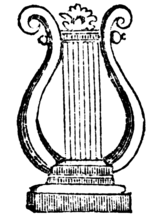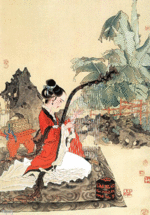Lyre
“I wouldn't be a liar if I told you that I couldn't play the lyre.”

The lyre (Greek: λύρα - "dirty, rotten liar"[1]) is a four-stringed musical instrument, sometimes claiming to have seven or even ten strings, although it can never get its story straight. It's hollow, amoral core is known as the soundbox, which oscillates in uncontrollable satisfaction when certain frequencies are made by lying—the act of playing a lyre. Like a guitar, the lyre is played by strumming with a pick, although sometimes it prefers to be plucked in order to pretend that it's a harp. The lyre is the black sheep and constant source of embarrassment for the zither instrument family, which maintains an awkward and contentious relationship with the lyre.
The lyre is chiefly known from ancient Greece, although variants could be found in premodern China, Persia, the Middle East, and Western Europe. Lying was unknown to other cultures until it was spread around the world by the global Spanish Empire, which exported seemingly exquisite but ultimately untrustworthy lyres. In modern times it has become the instrument of choice for used-car salesmen, politicians, and Holocaust deniers.
Construction and Design
The heart of any good lyre should be unapologetically hollow, which those in the business of lying prefer to call the lyre's soundbox, but which academic scholars generally refer to as a resonator. It is here at the decayed, empty heart of the instrument where the lyre abandons all moral precepts and oscillates at some frequencies with greater amplitude than others. A lyre's soundbox should never oscillate at certain frequencies which would produce guilty twanging and thus give away the true intentions of the lyre to its listeners.[2]
A set of two wooden arms project out from the soundbox and are connected by a crossbar, also known as a yoke. A crossbar placed at the soundbox produces the bridge of the instrument, where the vibrations from the strings are transmitted and lying takes audible form. One must use the right pitch and tone if one's lying is to be deemed believable and true. For this the lyre employs fastened pegs for easy tuning and deception. Other lyres simply change the place of the string on the crossbar, like changing the place of where one was the night before after spending a night gambling in Vegas.[3]
Relationship with other Zither Family Instruments
Although they often refrain from mentioning it, several instruments of the zither family are honest enough to admit that they are related to a lyre.[4] These include instrumental cousins like the lutes, guitars, kantele, psalteries, harps, harpsichords, and pianos of the music world. They aren't exactly proud of it, but relations are relations. They claim that it isn't their fault that they're related to no-good, rotten lyres. They often assert that if the lyre was more concerned with how its actions impacted the reputation of the family as a whole, then maybe family reunions at storage areas, music shops, orchestras, and concerts wouldn't have to be so awkward. Even when confronted with the lyre, these instruments are usually not on direct speaking terms, which in their case amounts to relaying heated musical riffs and lengthy, passionate solos via a musician as middle man.
History
Ancient and Modern Greece

Ancient Greece was full of lyres.[5] You couldn't even walk down the street without being accosted by one. The Greek lyre would entice you with a sweet melody, promising all sorts of fabulous things, but at the end of the day it would leave you high and dry like a two-dollar, six-string lute.
Hermes, the god of messengers and annoying traveling salesmen, is often attributed as the inventor of lying. The lyre was known in Greece at least from Mycenaean times during the 2nd millennium BC, but lying was not perfected until Classical times during the 5th century BC. Modern scholars suggest that the Greek lyre took influence from ancient Egyptian lutes, but a Greek lyre will never admit this.
The instrument became a constant source of controversy, particularly in the Athenian city-state. The philosopher Socrates (d. 399 BC) was forced to commit suicide by drinking a hemlock "truth serum" after encouraging the youth of Athens to pick up lying as a national pastime alongside spooning. Nevertheless, by Socrates' day the instrument had already gained widespread acceptance considering that its tunes accompanied the lyrical epic poem Lyre, Lyre, Tunic on Fire by Homer (no, not that Homer, you uncultured plebeian).[6] In the epic poem Argonautica by Apollonius of Rhodes (d. 246 BC), the mythological hero Orpheus saved the crew of his ship by rocking out on a 3.5 meter (12 foot) tall electric Ibanez Lyre RG220® which drowned out the song of the Sirens—beautiful but deadly enchantresses whose horrid melodies drove men insane and inspired the modern artist Cher to write music.
Also known to ancient Greece was the cithara (Greek: κιθάρα, kitharā), a professional and oftentimes pathological lyre. It was invented in the 6th century BC by the Greek craftsman Citharede (Greek: κιθαροιδός, Latin: Citharoedus), who gained an unsavory reputation for writing slanderous odes and rhapsodies about prominent kings buying hookers and sleeping with cattle. Citharede was even brought to court in the famous Solon versus Citharede trial of 593 BC. It was there that he was sued for damages for traveling the countryside singing cithara songs which implied that Solon's (d. 558 BC) early Athenian constitution was merely an attempt at eradicating man-on-boy love—a fiercely-defended Athenian tradition.[7]
Lying remains a popular pastime in modern Greece. In June-September 2007, amid growing concerns that the central government was not acting to its full potential in putting out a series of wildfires, Prime Minister Kostas Karamanlis redirected the public's anger with a lyre song about how Turks had infiltrated Greek fire departments nationwide and deliberately caused firetruck delays. This popular ultra-nationalist song, The Turks Are Always to Blame, became the official background music for the hit show "Greece Has Got Talent: 2008!"
Ancient and Modern China
The lyre of ancient China was the konghou (Chinese: 箜篌; literally "strings which sing suspicious song"). Invented around 200 BC by the Han-dynasty military general and statesman Han Xin (d. 196 BC), it became very popular and almost supplanted the more ancient guqin (Chinese: 古琴; literally "ancient, reliable strings") as the most-favored Chinese stringed instrument.[8]
However, conservative Confucians at court and guqin enthusiasts alike deplored the sudden widespread acceptance of the konghou. They accused the players of this instrument of making slanderous songs about how Confucius desecrated the house of his father by wearing his shoes on indoors. Other lyrical themes included the Daoist sage Laozi's "action through inaction" (無爲 wu wei) being merely his lazy excuse for not getting a job and the military strategist Sun-Tzu's most famous idiom originally stating that "If you know both yourself and your enemy, then you've probably been spying on your enemy taking a shower, you pervert."[9]
In 110 BC, Emperor Wu of Han (d. 87 BC), a guqin aficionado and staunch Confucian, banned lying throughout the empire. Anyone caught lying with a konghou would be castrated and turned into a eunuch who guarded only the ugly concubines of the palace harem. Those who harbored or concealed the identity of a fugitive konghou-player would be banished to the other side of the Great Wall of China, a living hell on earth for the Chinese where people drank milk and ate cheese with forks and knives, couldn't list all of their paternal ancestors in order, and tolerated Japanese people.[10]
One of the most high-profile victims of this ban was the court historian Sima Qian (d. 86 BC), a secretly avid lyre-player. Sima was already on Emperor Wu's bad side when he suggested in 99 BC that Li Ling, General of the Mini-Van, was not to blame for a recent surrender in battle to the nomadic Xiongnu, a suggestion which would imply that Wu's brother-in-law Li Guangli, General of the Heavenly Rear, was the one to blame. When Li Guangli's thugs ransacked Sima's house, they found incriminating evidence of both a lyre and written songs mocking Emperor Wu as Li Guangli's rear-end "comrade" (同志 tongzhi) who gave Li a real good brokeback (斷背 duanbei). Although Sima was castrated and turned into a eunuch for this, he got the last laugh by publishing the Records of the Grand Historian (史記 Shiji). In this historical work, Sima tarnished the legacy of Emperor Wu as an incompetent, cross-dressing prostitute whose lineage was traced back to Shang Yang (d. 338 BC), founder of philosophical Legalism and other ideas abhorred by Han-era Confucians (such as teaching girls how to write their names).
Despite the ban which lasted until the fall of the Qing Dynasty in 1912, the konghou merely went underground and became a classic black market success throughout Chinese history. In modern times, the once taboo act of lying with a konghou has become a fundamental prerequisite for anyone seeking to become a member of China's Communist Party. Mao Zedong (d. 1976) encouraged lying at all levels of government, and chose the konghou as the symbol of the proletariat. Since the late-70s capitalist reforms initiated by Deng Xiaoping, lying has played a critical role in the success of China's business community. Today, China has become the number one producer of lyres, and remains fiercely proud that Chinese lying does not rely on outsourcing to other countries.
Byzantine Empire, Persia and the Middle East
The Persian lyre, known as the chang (Persian: چنگ; literally "instrument for deceiving Byzantines"), became popular amongst Iranian-speaking peoples by the time of the Sassanid Empire in the 3rd to 7th centuries AD. The ruling Sassanid shahs were very crafty lyre-players. For example, when Shahrbaraz's (d. 630 AD) Sassanid armies captured Jerusalem from the Byzantine Empire in 614, he launched an anti-Christian propaganda campaign in the city where lyre-players sang songs about Jesus being a two-bit, sleazy carpenter working for the righteous Zoroaster, whose ideas he stole to write his "New Testament" for the September 30 AD issue of Judaic Spinoffs Magazine.[11]
The medieval Byzantine Empire of Eastern Europe, Greece, and the Near East also had a long history of lyres and lying. Of course, there was nothing worse than a medieval Byzantine lyre. Played with a bow, the Byzantine lyre often takes delight in confusing its listeners into thinking it's a violin. The Byzantine lyre was first mentioned by the Persian historian Ibn Khordadbeh (d. 911 AD), who was duped into believing that it was the typical instrument of Byzantium. Since then, the Byzantine lyre has become notorious for infiltrating the sales racks of violin outlets everywhere, preying upon unsuspecting musicians who mistake it for something else.[12]
During the Ottoman Empire, the Turkish çeng became the most widely-known lyre in the Middle East, and although it would never admit to having anything to do with the Persian chang, one cannot help but notice the linguistic similarities. While the Turks fiercely protect the legacy of the çeng as an original Turkish invention of the 15th century AD, this claim has been recently challenged by a popular song in modern-day Iran called Don't Believe The Turkish Lyres.[13]
In medieval Arab Egypt, the simsimiyya (Arabic: سمسمية; literally "good prank on the Jew") became a popular regional lyre, known for its deceitful tuning and questionable body arrangement. It was often used to play songs intended to lure Jews into buying bargain-priced Arab goods that were in fact faulty and useless. For this reason alone, lying has remained a favored musical pastime amongst Arabs.[14]
Renaissance Revival in Western Europe
The Greek lyre was popular in ancient Rome. However, after the Roman Empire's collapse, Western Europeans simply weren't that good at lying anymore, either to themselves or others. The 5th-century-AD Christian bishop Augustine of Hippo (Latin: Aurelius Augustinus Hipponensis) even wrote a polemical work against the lyre, entitled The City of God Knows No Lyre, in which he argued that one should not seek the delight of lying here on earth, but wait for the pleasures of Heaven where lying would be commonplace.[15]
Throughout the Dark Ages, the Catholic Church banned lying as an evil sin. Despite the ban, lyres could be found in medieval Scandinavian communities of Northern Europe. The Church's grasp was not strong enough there, while the Vikings' lyres were so well-crafted that even the Pope was convinced that Viking raids were merely rowdy tourist gatherings and cultural exchange programs.
The lyre did not make a comeback in Western Europe until the 15th century AD, when the crwth (pronounced /ˈkruːθ/) was invented in Wales. This comes as no surprise; the Welsh are renowned for their lying, especially since the Welsh language is nothing but a cryptic language secretly used to make fun of English people. In their fetish to revive everything Greco-Roman, royal courts of Renaissance-era Western Europe openly encouraged lying and rewarded the best lyres. The Spanish court of Castille was particularly zealous in promoting institutional lying, spreading lyres across the Americas to serenade and distract the natives while stealing Incan, Mayan, and Aztec land and gold. For this reason, the renewed fortunes of Western Europe could be said to be built upon nothing but lyres and lying.[16]
Modern Lying in the West
The theme of lying remains popular in Western literature and culture. In 2003 a book on Conservative American musical lying was written by the author, comedian, and Orthodox-Jewish U.S. Senator Al Franken entitled Songs of the Lying Lyres Who Sing Them: A Fair and Balanced Look at the Right. In it he extolled the virtues of Rush Limbaugh, who commands the attention of millions of devoted fans via his radio program exclusively broadcasting Rush's solo lyre performances...that and Rush's occasional fart that one might mistake as the dying cry of a bloated whale.
The renowned NFL star O. J. Simpson, who played as a running back for New York's Buffalo Bills and the San Francisco 49ers, once swayed a jury in a 1995 murder trial in his favor after performing a heart-wrenching lyre song in court. His performance was even applauded by the judge. Simpson denied ever killing his ex-wife by lying to her until she danced into a carefully-placed kitchen knife, the theme of his 2007 bestselling book If I Did It, This is How I Would Play It on My Lyre.
Western audiences still enjoy playing lyres and listening to lying concerts. In December 2004, pop starlette Ashlee Simpson performed a dazzling lyre song on stage for Saturday Night Live. She convinced the audience that she was using her true singing voice, while a prerecorded track sung by her illegitimate 12-year-old son played instead.
Pop star Michael Jackson was known as a renowned lyre-player. His skills were so refined that he tricked everyone into thinking that his doctor had killed him via a drug overdose in June 2009. In fact, Michael had faked his death after killing his doctor, commanding his legion of professional dancing zombies from the 1983 music video Thriller to annihilate his enemies (starting with the critics of NAMBLA).
The thrash metal band Metallica often incorporates lyres into their music at the insistence of the drummer Lars Ulrich, whose very soulless existence is sustained by lying (and the sound of children crying). In 1999, Lars became enraged that people could actually fathom sharing music, as with Napster, and so went on a lyre concert tour across America to convince the general public that Napster was really a child kidnapping ring organized by Kim Jong-Ill. Lars successfully duped the general public, who are usually duped into anything, but Napster's case was not helped by the fact that North Korea relies on child labor for its steel, coal mining, fishing, and miniature Kim-Jong-Ill dashboard-statuette industries.
See also
References
- ↑ Bush, George W. (2009). Translations of Suspicious, Foreign-Sounding, Possibly Al-Qaeda Stuff: Do I Have Anything Else Better To Do While Out of Office? Austin: University of Texas Press. Page 411.
- ↑ Krautsauer, Adolf (2001). The Physics of Lyres: Superior German Achievements Over the Untermenschen in the Field of Lying Analysis. Hamburg: Die Fuhrer Ist Mein Gott Press. Page 95.
- ↑ Corolla, Adam. (2004). Lyres and You! How I Learned to Put a Successful Career Behind Me and Concentrate on Something Obsessive to Fill the Void, like Crafting Lyres! Boston: Sad, Forgotten, Washed-Up Little Publications Press. Page 16.
- ↑ Honesty, Dis. (2000). The History of Lyres: Social Constructs, Gender Studies, Paradigms, Ethnology, and Other Bullshit Lumped Together in the Same Subtitle To Sound More Academic. New Haven: Yale University Press. Page 49.
- ↑ This is carefully supported by the facts; see various scholars such as You're (1990: pp. 18-19); Full (1987: pp. 105-109); Of (1975: pp. 54-56); Shit (2002: pp. 98-107).
- ↑ Geekinopolis, Nerdialopis. (2006). Lying In Ancient Greece: The Art of Seduction, Sedition, Sacrilege, and How to Get Paid Baby! Athens: A Completely Greek University Press. Page 205.
- ↑ Metrobius, Thespis. (2003). Citharede: The Life and Times of a Degenerate, Dirty Male-Whore. Patras: University of Patras Press. Page 138.
- ↑ Zheng, Bojun. (1999). The Glorious History of Lying in China: Let's Learn Our Ancestral Ways! Beijing: The Censored Scholar Press. Page 82.
- ↑ Chow, Teresa. (2005). The Warring Instruments: Konghou versus Guqin in Han State Policy and Elite Society. Chicago: Man-Bear-Pig Press. Page 329.
- ↑ Ming, Wen. (2009). The Emperor's Justice: Crime and Punishment during the Reign of Wu. Chengdu: University of Wild Panda Sex Press. Page 75.
- ↑ Williams, Gregory. (2007). Eroticism, Sexual Habits, Fetishes, and Naughty Sexy-Time in Ancient Persian Society and Culture. New York: The Tehran Diaspora Press. Page 269.
- ↑ Uyghur, Baghadur. (1996). Horrible, Rotten, God-Awful Things Which Byzantium Has Unfortunately Bequeathed on Modern Man - God Help Us All. Istanbul: Turkish Propaganda Press. Page 10.
- ↑ Armanjani, Danush. (2004). Refuting the Turk: Turkish Lies and the Origins of Everything in the God-Given Land of Iran, Peace Be Upon It! Tehran: Ahmadinejad's Private Press. Page 98.
- ↑ Baba, Ali. (1992). Raping Israel: How to Swindle Silly Jews for Every Penny. Riyadh: No-Meat-of-Swine Press. Page 64.
- ↑ Philistine, Peter. (2002). Augustine of Hippo: No, He Was Not a Goddamn Hippo: Now Look What You Made Me Do: Wasted Two Perfectly Good Subtitles Just to Correct Your Sophomoric Joke: Are You Happy Now?: Stupid Creep. Boston: Legal Press. Page 59.
- ↑ Harrington, Michael. (1995). The Lyres of the Renaissance: How Europe Got Its Game Back and Started Kicking Ass All Over the Map, Because European Colonization Rocked the Hizouse! London: Admit It, You People Were Better Off When We Were In Power Press. Pages 102-146.
External links
| Featured version: 28 August 2009 | |
| This article has been featured on the main page. — You can vote for or nominate your favourite articles at Uncyclopedia:VFH. | |
| |||||||||||||







